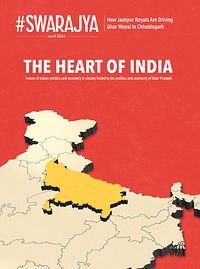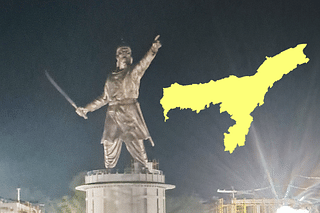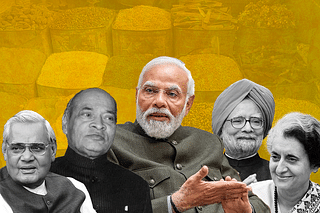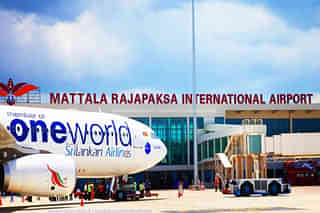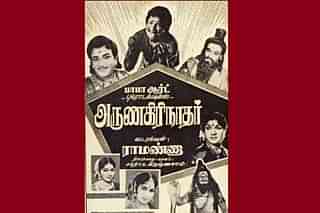Ideas
Two Cheers For "Brahminism"!
Harsh Gupta Madhusudan
Aug 14, 2023, 07:18 PM | Updated 07:17 PM IST
Save & read from anywhere!
Bookmark stories for easy access on any device or the Swarajya app.
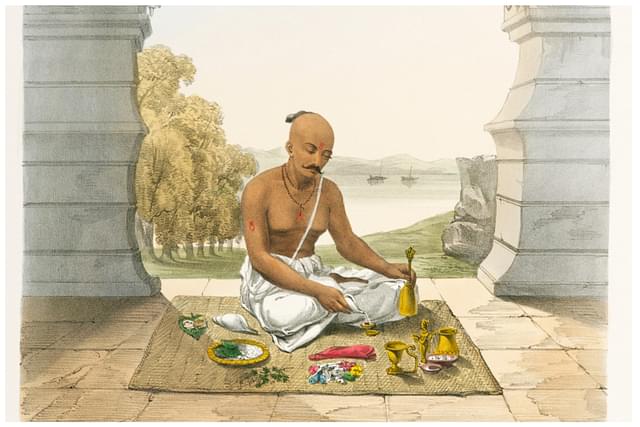
There are two types of Brahminical systems: caste-Brahminism and syncretic-Brahminism.
They are conceptually very different, in some ways even antithetical, though they did overlap historically in India and globally - especially when our civilisation was on the defensive.
But it is deeply unfortunate that almost the entirety of the discourse is focused on the hereditary caste aspect of Brahminism, which I oppose strongly, and almost nothing is discussed about the syncretic/pluralistic aspect of Brahminism, which is the very beating heart, indeed, beautiful core of Dharma.
It is because of the latter, while being aware of the former, that I always say - two cheers for Brahminism!
This is a term that we must discuss because we cannot get defensive about it in front of Dharma's enemies. For we need Brahminism in the syncretic sense to once again expand Dharma globally.
But before discussing that, let us first pause and think how a few Vedic Rishis in the Sindhu-Saraswati civilisation transformed all of India.
They boldly said: 'Ekam sat vipra bahudha vadanti' or 'Truth is One, the Wise call it differently'.
This being the North Star, over centuries and millennia—in a very much Brahminical process that still continues internally, in the diaspora and beyond—many a Gram/Kul/Ishta Devta (local, family, personal God) got mapped to a so-called higher or mainstream God or Goddess as an avatar or some other manifestation, and vice versa as well.
One can read about a Jagannath Puri or a hundred other deities/temples/traditions, and realise that they all were at one point as relatively discrete as a Donyi Polo tradition in Arunachal may today be from a Zeliangrong faith of Nagaland.
But over time, the theogony of the Gods and Goddesses was divined. The Puranas and other sacred literature were written.
Some who wrote thus may have been philosophically monist, deist or even skeptic. But that somehow deepened their faith, and over many lifetimes and with a bit of sincere playfulness, we modified, merged and made our Gods - just like They made us.
For the average lay Hindu after all, this is by now Second Nature.
The one who says he has no Sampradaya or Panth is in some ways a de facto Smartha after all, with his small home-temple best resembling the Panchayatana Puja in spirit if not in letter. Shiva, Vishnu, Shakti, Surya, Ganesha are worshipped - in one form or the other - even as One maybe closer to the soul.
This "translation" instinct, this epistemic humility and respect for ontological diversity, is actually a universal human instinct but without some connecting tissue or structure it can be, and has been, crushed in many other parts of the world.
Yet it survived here, though with deep damage, because our Rishis proactively connected us all in deeper golden threads.
If the hereditary-Brahminism aspect weakened our sociopolitical structures leaving us vulnerable to a sustained attack in the first place, the syncretic-Brahminism aspect allowed us to keep conquering the conquerors to a certain extent.
Anyway, once the civilisational doors had been smashed - the two had to be unfortunately further joined at the hip, but with reform and robustness now there is no need for that anymore.
What we need now is to re-ignite that universal and syncretic spirit so that Rishis from China, Africa, Europe, Middle East and the Americas write or re-write their Puranas about their Old Gods as well as Their New Forms, and connect Them with One Another.
These Rishis could be sons or daughters of fisherwomen or fund managers, philanthropists or philosophers.
Whoever steps up, India must help - and with humility from the backstage.
After all, with rising education and prosperity and the climbing up Maslow's Pyramid, there is a crisis of meaning globally as fixed dogmas are no longer spiritually nourishing.
Dharma must step up, else a world of rapid innovation and powerful technologies could trigger our own doom.
To accomplish this critical mission of nurturing a truly universalistic and pluralistic human civilisation, we need Brahminism, Druidism, Okomfoism etc. We need those who can truly See from any and every part of humanity.
Save & read from anywhere!
Bookmark stories for easy access on any device or the Swarajya app.
Harsh is an investor, and the coauthor of two books - latest being 'A New Idea of India'.
Introducing ElectionsHQ + 50 Ground Reports Project
The 2024 elections might seem easy to guess, but there are some important questions that shouldn't be missed.
Do freebies still sway voters? Do people prioritise infrastructure when voting? How will Punjab vote?
The answers to these questions provide great insights into where we, as a country, are headed in the years to come.
Swarajya is starting a project with an aim to do 50 solid ground stories and a smart commentary service on WhatsApp, a one-of-a-kind. We'd love your support during this election season.
Click below to contribute.
